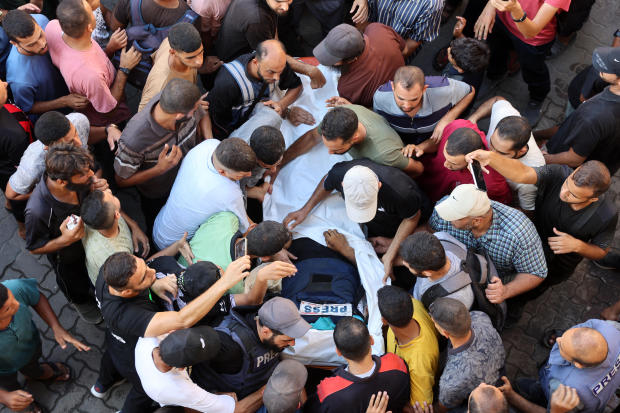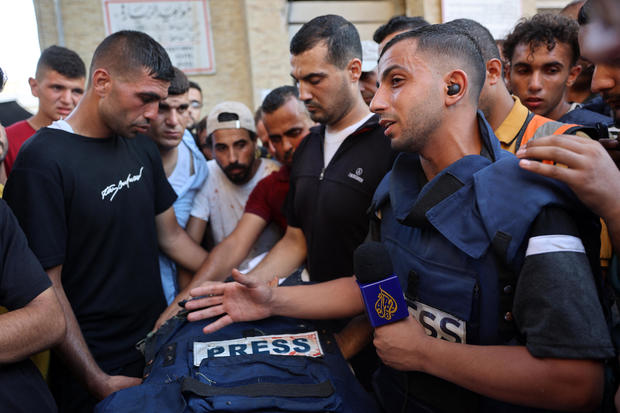
2 Al Jazeera staffers killed in Gaza bring journalist deaths to 113 since Israel-Hamas war started, group says
Al Jazeera reporter Ismail al-Ghoul and photographer Rami al-Refee were killed Wednesday in an Israeli strike in Gaza, becoming at least the 112th and 113th journalist or media worker — the vast majority of whom are Palestinian — to be killed since the war between Israel and Hamas began, according to data compiled by the Committee to Protect Journalists. The period since the start of the war has been the deadliest for journalists since the CPJ began gathering data in 1992.
“This is the second strike on an Al Jazeera journalist in a car,” CPJ CEO Jodie Ginsberg told CBS News. “That raises really disturbing questions about whether or not journalists are being deliberately targeted. … Whenever you see a case in which it appears that a particular building or a particular car has been targeted, and other cars or buildings in the area have been left alone, then that gives you reason to suspect that those places have been deliberately targeted, and of course, journalists are civilians and should never be targeted.”
The two journalists were reporting from near the Gaza home of Ismail Haniyeh, the political leader of Hamas who was assassinated in Iran earlier Wednesday.
OMAR AL-QATTAA/AFP/Getty
Al Jazeera called the killing of its journalists a “cold blooded assassination.”
according to the CPJ. Dozens more have been reported injured or arrested.
“Journalists have been paying the highest price — their lives — for their reporting. Without protection, equipment, international presence, communications or food and water, they are still doing their crucial jobs to tell the world the truth,” CPJ Program Director Carlos Martinez de la Serna said.
Israel has rarely permitted any international journalists to enter Gaza since the war there began, so reporting on the conflict in the besieged enclave has fallen to local journalists, who’ve been both covering and living through the fighting and the humanitarian crisis caused by it for months.
“That places a huge burden on local journalists, because they’re not only having to do reporting in these extraordinarily difficult conditions, but then almost having to prove every every time to the outside world that they’re trustworthy in a way that, you know, we didn’t necessarily see when Ukrainians were reporting on the war in Ukraine,” Ginsberg told CBS News.
OMAR AL-QATTAA/AFP/Getty
In addition to the physical risks and hardships they face, journalists in Gaza face a myriad of other kinds of attacks that make their lives and work more dangerous, the CPJ says, citing numerous arrests, cyberattacks, threats, assaults, and censorship the group has documented.
“We see trolling campaigns, hate campaigns against individual journalists looking for anything that might be evidence that they’re not trustworthy,” Ginsberg said.
“It can put [journalists] in danger because they might then be considered targets within Gaza, but it also happens outside even in Israel where those journalists find themselves to be much more vulnerable and might be harassed online, or what we’ve seen done is physically harassed as well,” Ginsberg told CBS News.
“As every day goes by, and you have fewer and fewer journalists reporting [in Gaza], that means you have less and less information coming out about what’s happening, and that creates a situation in which the international community potentially loses interest, and that’s incredibly dangerous in any conflict,” Ginsberg said. “Being able to report what’s happening is intrinsically linked to being able to affect change.”
More
More
Source: cbsnews.com
